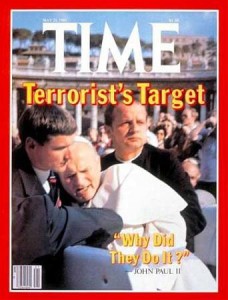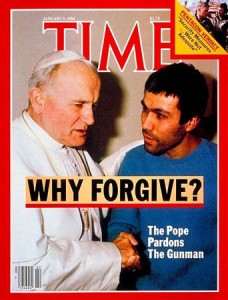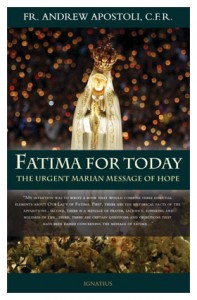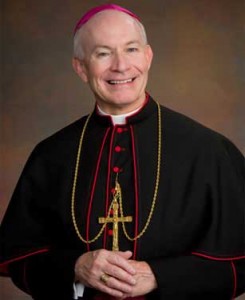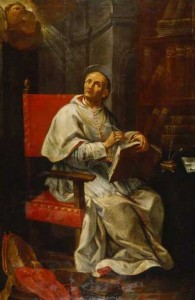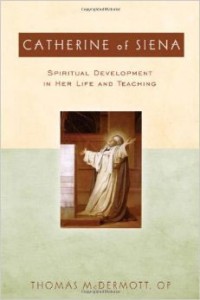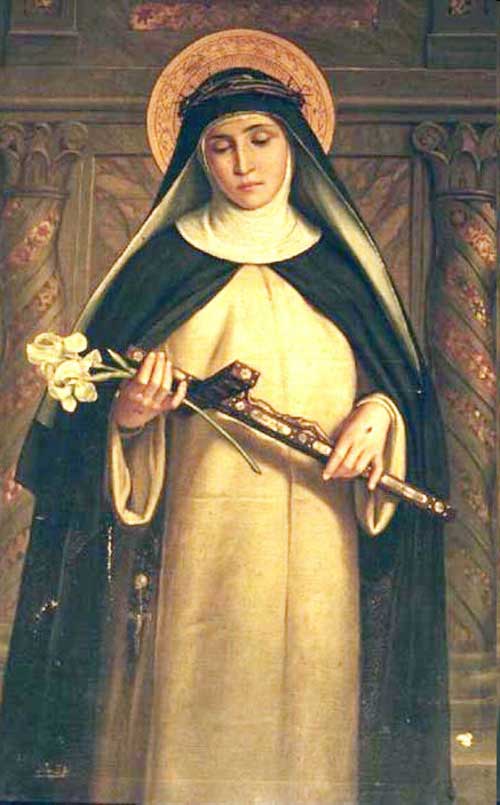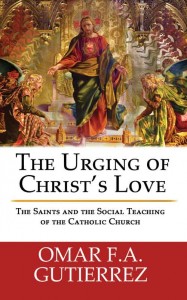[powerpress]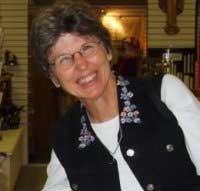
Join Bruce and I as we discuss Our Lady of Fatima with Teresa Monaghen of the Pro Sanctity Movement.
She also shares with us the complying memory of May 13, 1981 when she was in the square at St. Peter’s and St. John Paul II was shot.
For more on the Message of Fatima click here
Tags: catholic, catholic podcast, catholic prayer, cathollc spirituality, john paul ii, Join Bruce, teresa monaghen
This entry was posted on Tuesday, May 13th, 2014 at 5:32 am
You can follow any responses to this entry through the RSS 2.0 feed.
Fr. Andrew Apostoli does a tremendous job covering all the varied aspects of the events of Fatima and the  call  of Our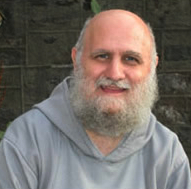 Lady of Fatima. He conveys the “immaculate” heart of the message, as well as tackling the “controversies” that have plagued the events over the years.  Because of the prophetic nature of her messages, Our Lady of Fatima has been the subject of much controversy and speculation. In this book, Father Andrew Apostoli carefully analyzes the events that took place in Fatima and clears up lingering questions and doubts about their meaning. He also challenges the reader to hear anew the call of Our Lady to prayer and sacrifice, for the world is ever in need of generous hearts willing to make reparation for those in danger of losing their way to God.
Lady of Fatima. He conveys the “immaculate” heart of the message, as well as tackling the “controversies” that have plagued the events over the years. Â Because of the prophetic nature of her messages, Our Lady of Fatima has been the subject of much controversy and speculation. In this book, Father Andrew Apostoli carefully analyzes the events that took place in Fatima and clears up lingering questions and doubts about their meaning. He also challenges the reader to hear anew the call of Our Lady to prayer and sacrifice, for the world is ever in need of generous hearts willing to make reparation for those in danger of losing their way to God.
[powerpress]
Check out the book here
“As was so dramatically obvious during the visit of Pope Benedict XVI to Fatima in May, 2010, Our Lady’s apparitions in 1917 remain powerfully compelling for us today. There she was an evangelist, calling us to prayer, conversion of heart, and penance, pointing to Jesus and repeating her words at Cana, ‘Do whatever He tells you.’ This book brings it all home.”
-Most Reverend Timothy Dolan, Archbishop of New York
“For us, Fatima is a sign of the presence of faith, of the fact that it is precisely from the little ones that faith gains new strength, one which is not limited to the little ones but has a message for the entire world and touches history here and now, and sheds light on this history . . . Even now there is tribulation, in every conceivable form, and power threatens to trample down faith. Even now, then, there is a need for the answer about which the Mother of God spoke to the children at Fatima.”
-Pope Benedict XVI
Tags: andrew apostoli, catholic, catholic podcast, catholic prayer, cathollc spirituality, lady of fatima, pope benedict xvi
This entry was posted on Tuesday, May 13th, 2014 at 12:28 am
You can follow any responses to this entry through the RSS 2.0 feed.
“My sheep hear my voice, and no one shall snatch them out of my hand”
[powerpress]
an excerpt from today’s reflection by Don Schwager: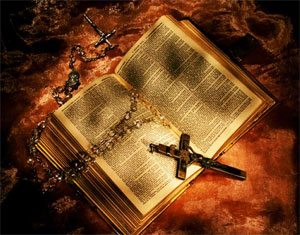
How secure is your faith and trust in God? Scripture describes God’s word as a “lamp for our feet and a light for our steps”(Psalm 119:105). The Jewish Feast of the Dedication is also called the Festival of Lights or Hanakkuh. This feast was held in late December, near the time when Christians celebrate the feast of Christmas. This is the time of year when the day is shortest and the night longest. Jesus used this occasion to declare that he is the true light of the world (John 8:12). In his light we can see who God truly is and we can find the true path to heaven.
Jesus speaks of the tremendous trust he has in God his Father and the tremendous trust we ought to have in him because he is our good shepherd (John 10:11). Sheep without a shepherd are defenseless against prey, such as wolves, and often get lost and bewildered without a guide. That is why shepherds literally live with their sheep out in the open field and mountain sides. The shepherd guards his sheep from the dangers of storms, floods, and beasts of prey. The shepherd leads his sheep to the best places for feeding and the best streams for drinking. He finds the best place for their rest and safety at night. The sheep recognize the voice of their shepherd and heed his call when he leads them to safe pasture and rest.
We are very much like sheep who stray, we become easy prey to forces which can destroy us – sin, Satan, and a world in opposion to God and his people. The Lord Jesus came not only to free us from Satan’s snares and the grip of sin, he came to personally lead us to the best of places where we can feed on his “word of life” and drink from the “living waters” of his Holy Spirit. The sheep who heed the voice of Jesus, the good shepherd, have no fear. He leads them to the best of places – everlasting peace, joy, and fellowship with God and his people.
In this present life we will encounter trials, difficulties, and persecution. We can face them alone or we can follow Jesus, the true shepherd, who will bring us safely through every difficulty to the place of peace and security with God. Do you listen to the voice of the Good Shepherd and heed his commands?
“Lord Jesus, you are the Good Shepherd who secures what is best for us. I place all my hope and trust in you. Open my ears to hear your voice today and to follow your commands.”
for the full reflection visit :Â Daily Reading and Meditation
Tags: catholic, catholic podcast, catholic prayer, cathollc spirituality
This entry was posted on Tuesday, May 13th, 2014 at 12:15 am
You can follow any responses to this entry through the RSS 2.0 feed.
“I am the Good Shepherd”
[powerpress ]
an excerpt from today’s reflection by Don Schwager: 
Do you know the peace and security of the Good Shepherd who watches over his own? The Old Testament often speaks of God as shepherd of his people, Israel. The Lord is my shepherd, I shall not want(Psalm 23:1). Give ear, O Shepherd of Israel, you who lead Joseph like a flock! (Psalm 80:1) We are his people, and the sheep of his pasture (Psalm 100:3). The Messiah is also pictured as the shepherd of God’s people: He will feed his flock like a shepherd, he will gather the lambs in his arms (Isaiah 40:11). Jesus says he is the Good Shepherd who will risk his life to seek out and save the stray sheep (Matthew 18:12, Luke 15:4). He is the Shepherd and Guardian of our souls (1 Peter 2:25).
Jesus made three promises to his followers. He promised them everlasting life. If they accept him and follow him, they will have the life of God in them. Jesus also promised them a life that would know no end. Death would not be the end but the beginning; they would know the glory of indestructible life. Jesus promised a life that was secure. Jesus said that nothing would snatch them out of his hand, not even sorrow and death, since he is everlasting life itself. Our lives are safe in his hands.
Do you listen attentively to the voice of the Good Shepherd and obey his word?
“Lord Jesus, you are the Good Shepherd who keeps watch over our lives. May I be ever attentive to your voice and submit fully to your wise rule for my life. Draw me near to you that I may always find peace and joy in your presence.â€
for the full reflection visit : Daily Reading and Meditation
Tags: catholic, catholic podcast, catholic prayer, cathollc spirituality, Lord Jesus, O Shepherd
This entry was posted on Monday, May 12th, 2014 at 12:05 am
You can follow any responses to this entry through the RSS 2.0 feed.
“I will raise you up at the last day“
[powerpress]
an excerpt from today’s reflection by Don Schwager:
Jesus makes a claim only God can make: He is the true bread of heaven that can satisfy the deepest hunger we experience. The manna from heaven prefigured the superabundance of the unique bread of the Eucharist or Lord’s Supper which Jesus gave to his disciples on the eve of his sacrifice. The manna in the wilderness sustained the Israelites on their journey to the Promised Land. It could not produce eternal life for the Israelites. The bread which Jesus offers his disciples sustains us not only on our journey to the heavenly paradise, it gives us the abundant supernatural life of God which sustains us for all eternity.
When we receive from the Lord’s table we unite ourselves to Jesus Christ, who makes us sharers in his body and blood and partakers of his divine life. Ignatius of Antioch (35-107 A.D.) calls it the “one bread that provides the medicine of immortality, the antidote for death, and the food that makes us live for ever in Jesus Christ” (Ad Eph. 20,2). This supernatural food is healing for both body and soul and strength for our journey heavenward.
Jesus offers us the abundant supernatural life of heaven itself – but we can miss it or even refuse it. To refuse Jesus is to refuse eternal life, unending life with the Heavenly Father. To accept Jesus as the bread of heaven is not only life and spiritual nourishment for this world but glory in the world to come. When you approach the Table of the Lord, what do you expect to receive? Healing, pardon, comfort, and rest for your soul? The Lord has much more for us, more than we can ask or imagine. The principal fruit of receiving the Eucharist or Lord’s Supper is an intimate union with Christ. As bodily nourishment restores lost strength, so the Eucharist strengthens us in charity and enables us to break with disordered attachments to creatures and to be more firmly rooted in the love of Christ. Do you hunger for the “bread of life”?
“Lord Jesus, you are the living bread which sustains me in this life. May I always hunger for the bread which comes from heaven and find in it the nourishment and strength I need to love and serve you wholeheartedly. May I always live in the joy, peace, and unity of the Father, Son, and Holy Spirit, both now and in the age to come.”
for the full reflection visit : Daily Reading and Meditation
Tags: bread of heaven, catholic, catholic podcast, catholic prayer, cathollc spirituality, jesus christ, Lord Jesus
This entry was posted on Friday, May 9th, 2014 at 12:02 am
You can follow any responses to this entry through the RSS 2.0 feed.
“I will raise you up at the last day”
[powerpress]
an excerpt from today’s reflection by Don Schwager:
Jesus makes a claim only God can make: He is the true bread of heaven that can satisfy the deepest hunger we experience. The manna from heaven prefigured the superabundance of the unique bread of the Eucharist or Lord’s Supper which Jesus gave to his disciples on the eve of his sacrifice. The manna in the wilderness sustained the Israelites on their journey to the Promised Land. It could not produce eternal life for the Israelites. The bread which Jesus offers his disciples sustains us not only on our journey to the heavenly paradise, it gives us the abundant supernatural life of God which sustains us for all eternity.
When we receive from the Lord’s table we unite ourselves to Jesus Christ, who makes us sharers in his body and blood and partakers of his divine life. Ignatius of Antioch (35-107 A.D.) calls it the “one bread that provides the medicine of immortality, the antidote for death, and the food that makes us live for ever in Jesus Christ” (Ad Eph. 20,2). This supernatural food is healing for both body and soul and strength for our journey heavenward.
Jesus offers us the abundant supernatural life of heaven itself – but we can miss it or even refuse it. To refuse Jesus is to refuse eternal life, unending life with the Heavenly Father. To accept Jesus as the bread of heaven is not only life and spiritual nourishment for this world but glory in the world to come. When you approach the Table of the Lord, what do you expect to receive? Healing, pardon, comfort, and rest for your soul? The Lord has much more for us, more than we can ask or imagine. The principal fruit of receiving the Eucharist or Lord’s Supper is an intimate union with Christ. As bodily nourishment restores lost strength, so the Eucharist strengthens us in charity and enables us to break with disordered attachments to creatures and to be more firmly rooted in the love of Christ. Do you hunger for the “bread of life”?
“Lord Jesus, you are the living bread which sustains me in this life. May I always hunger for the bread which comes from heaven and find in it the nourishment and strength I need to love and serve you wholeheartedly. May I always live in the joy, peace, and unity of the Father, Son, and Holy Spirit, both now and in the age to come.”
for the full reflection visit : Daily Reading and Meditation
Tags: bread of heaven, catholic, catholic podcast, catholic prayer, cathollc spirituality, jesus christ, Lord Jesus
This entry was posted on Thursday, May 8th, 2014 at 8:34 am
You can follow any responses to this entry through the RSS 2.0 feed.
“If anyone eats of this bread, he will live for ever”
[powerpress]
an excerpt from today’s reflection by Don Schwager: 
Jesus makes a claim only God can make: He is the true bread of heaven that can satisfy the deepest hunger we experience. The manna from heaven prefigured the superabundance of the unique bread of the Eucharist or Lord’s Supper which Jesus gave to his disciples on the eve of his sacrifice. The manna in the wilderness sustained the Israelites on their journey to the Promised Land. It could not produce eternal life for the Israelites. The bread which Jesus offers his disciples sustains us not only on our journey to the heavenly paradise, it gives us the abundant supernatural life of God which sustains us for all eternity. When we receive from the Lord’s table we unite ourselves to Jesus Christ, who makes us sharers in his body and blood and partakers of his divine life. Ignatius of Antioch (35-107 A.D.) calls it the “one bread that provides the medicine of immortality, the antidote for death, and the food that makes us live for ever in Jesus Christ” (Ad Eph. 20,2). This supernatural food is healing for both body and soul and strength for our journey heavenward.
Jesus offers us the abundant supernatural life of heaven itself – but we can miss it or even refuse it. To refuse Jesus is to refuse eternal life, unending life with the Heavenly Father. To accept Jesus as the bread of heaven is not only life and spiritual nourishment for this world but glory in the world to come. When you approach the Table of the Lord, what do you expect to receive? Healing, pardon, comfort, and rest for your soul? The Lord has much more for us, more than we can ask or imagine. The principal fruit of receiving the Eucharist or Lord’s Supper is an intimate union with Christ. As bodily nourishment restores lost strength, so the Eucharist strengthens us in charity and enables us to break with disordered attachments to creatures and to be more firmly rooted in the love of Christ. Do you hunger for the “bread of life”?
“Lord Jesus, you are the living bread which sustains me in this life. May I always hunger for the bread which comes from heaven and find in it the nourishment and strength I need to love and serve you wholeheartedly. May I always live in the joy, peace, and unity of the Father, Son, and Holy Spirit, both now and in the age to come.”
for the full reflection visit : Daily Reading and Meditation
Tags: bread of heaven, catholic, catholic podcast, catholic prayer, cathollc spirituality, jesus christ, Lord Jesus
This entry was posted on Wednesday, May 7th, 2014 at 12:03 am
You can follow any responses to this entry through the RSS 2.0 feed.
USCCA41 Â Chapter 32 – Tell the Truth: The 8th Commandment
[powerpress]
Archbishop Lucas offers insights on the US Catholic Catechism for Adults Chapter 32:
“Lying is the most direct offense against the truth…. By injuring man’s relation to truth and to his neighbor, a lie offends against the fundamental relation of man and of his word to the Lord†(CCC, no. 2483). People sin against the truth when they are guilty of ruining the reputation of another by telling lies, when they practice rash judgment, or when they engage in detraction (the unjust telling of someone’s faults), perjury (lying under oath), or calumny (telling lies about another).
Scripture is clear about the evil of lying. In the Sermon on the Mount, Jesus said, “Let your ‘Yes’ mean ‘Yes’ and your ‘No’ mean ‘No.’ Anything more is from the evil one†(Mt 5:37). This reminds us not only that we need to be truthful, but also that hypocrisy—saying one thing while doing the opposite—is a sin against truth.
In the Gospel of John, Jesus describes the devil as father of lies (cf. Jn 8:44). St. Paul discouraged lying: “Stop lying to one anotherâ€(Col 3:9); “Speak the truth, each one to his neighbor, for we are members one of another†(Eph 4:25).
Happily, history is filled with stories of people who valued the truth so highly that they were willing to die for it. St. John Fisher (1469-1535) and St. Thomas More (1478-1535) surrendered their lives rather than approve of the divorce of King Henry VIII or deny the truth that the pope is Christ’s appointed head of the Church. During World War II, Franz Jagerstatter, an Austrian farmer, refused to accept the lies of the Nazis, and he was martyred for his commitment to Christ’s truth. During the French Revolution, a convent of Carmelite nuns chose to ignore laws that disbanded their monastery and continued to live together as a community. They courageously went to the guillotine rather than abandon the truth for which their vows stood.
United States Conference of Catholic Bishops (USCCB) (2012-04-02). United States Catholic Catechism for Adults (Kindle Locations 6248-6261). United States Conference of Catholic Bishops (USCCB). Kindle Edition.
The Most Reverend George J. Lucas leads the Archdiocese of Omaha.Â
For other episodes in the visit our Archbishop George Lucas page
This programs is based on:
More information can be found here.
We wish to thank the USCCB for the permissions granted for use of  relevant material used in this series.
Tags: catholic, catholic podcast, catholic prayer, cathollc spirituality, George Lucas, United States Catholic Catechism, United States Conference of Catholic Bishops
This entry was posted on Wednesday, April 30th, 2014 at 4:06 am
You can follow any responses to this entry through the RSS 2.0 feed.
Dr. Matthew Bunson discusses the life, times and teachings of St. Peter Damian
-
Born: 1007, Ravenna, Italy
-
Died: February 23, 1072, Faenza, Italy
From Vatican.va, an excerpt from the teachings of Pope Benedict XVI General Audience 2009
St Peter Damian, who was essentially a man of prayer, meditation and contemplation, was also a fine theologian: his reflection on various doctrinal themes led him to important conclusions for life. Thus, for example, he expresses with clarity and liveliness the Trinitarian doctrine, already using, under the guidance of biblical and patristic texts, the three fundamental terms which were subsequently to become crucial also for the philosophy of the West: processio, relatio and persona (cf. Opusc. XXXVIII: PL CXLV, 633-642; and Opusc. II and III: ibid., 41 ff. and 58 ff). However, because theological analysis of the mystery led him to contemplate the intimate life of God and the dialogue of ineffable love between the three divine Persons, he drew ascetic conclusions from them for community life and even for relations between Latin and Greek Christians, divided on this topic. His meditation on the figure of Christ is significantly reflected in practical life, since the whole of Scripture is centred on him. The “Jews”, St Peter Damian notes, “through the pages of Sacred Scripture, bore Christ on their shoulders as it were” (Sermo XLVI, 15). Therefore Christ, he adds, must be the centre of the monk’s life: “May Christ be heard in our language, may Christ be seen in our life, may he be perceived in our hearts” (Sermo VIII, 5). Intimate union with Christ engages not only monks but all the baptized. Here we find a strong appeal for us too not to let ourselves be totally absorbed by the activities, problems and preoccupations of every day, forgetting that Jesus must truly be the centre of our life.
Communion with Christ creates among Christians a unity of love. In Letter 28, which is a brilliant ecclesiological treatise, Peter Damian develops a profound theology of the Church as communion. “Christ’s Church”, he writes, is united by the bond of charity to the point that just as she has many members so is she, mystically, entirely contained in a single member; in such a way that the whole universal Church is rightly called the one Bride of Christ in the singular, and each chosen soul, through the sacramental mystery, is considered fully Church”. This is important: not only that the whole universal Church should be united, but that the Church should be present in her totality in each one of us. Thus the service of the individual becomes “an expression of universality” (Ep 28, 9-23). However, the ideal image of “Holy Church” illustrated by Peter Damian does not correspond as he knew well to the reality of his time. For this reason he did not fear to denounce the state of corruption that existed in the monasteries and among the clergy, because, above all, of the practice of the conferral by the lay authorities of ecclesiastical offices; various Bishops and Abbots were behaving as the rulers of their subjects rather than as pastors of souls. Their moral life frequently left much to be desired. For this reason, in 1057 Peter Damian left his monastery with great reluctance and sorrow and accepted, if unwillingly, his appointment as Cardinal Bishop of Ostia. So it was that he entered fully into collaboration with the Popes in the difficult task of Church reform. He saw that to make his own contribution of helping in the work of the Church’s renewal contemplation did not suffice. He thus relinquished the beauty of the hermitage and courageously undertook numerous journeys and missions.
Because of his love for monastic life, 10 years later, in 1067, he obtained permission to return to Fonte Avellana and resigned from the Diocese of Ostia. However, the tranquillity he had longed for did not last long: two years later, he was sent to Frankfurt in an endeavour to prevent the divorce of Henry iv from his wife Bertha. And again, two years later, in 1071, he went to Monte Cassino for the consecration of the abbey church and at the beginning of 1072, to Ravenna, to re-establish peace with the local Archbishop who had supported the antipope bringing interdiction upon the city.
On the journey home to his hermitage, an unexpected illness obliged him to stop at the Benedictine Monastery of Santa Maria Vecchia Fuori Porta in Faenza, where he died in the night between 22 and 23 February 1072.
For more visit Vatican.va
Dr. Matthew Bunson, Senior Fellow of the St. Paul Center for Biblical Theology, is one of the United States’ leading authorities on the papacy and the Church.
His books include: The Encyclopedia of Catholic History; The Encyclopedia of Saints; Papal Wisdom; All Shall Be Well; Encyclopedia of the Roman Empire; and The Angelic Doctor: The Life and World of St. Thomas Aquinas; The Pope Encyclopedia; We Have a Pope! Benedict XVI, the first Catholic biography of the Holy Father in the English language; the Encyclopedia of U.S. Catholic History; Pope Francis. His also the editor of OSV’s “The Catholic Answer” magazine.
Tags: catholic, catholic podcast, catholic prayer, cathollc spirituality
This entry was posted on Tuesday, April 29th, 2014 at 8:37 am
You can follow any responses to this entry through the RSS 2.0 feed.
Episode 11 -The Way of Mystery: The Eucharist and Moral Living 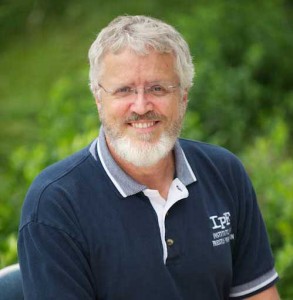
The Liturgy of the Eucharist part 3 : The Eucharistic Prayer…God teaching us to pray. What are we doing in our participation and are we truly ready to receive the Body of Christ? Should we, in integrity, receive the Truth of Christ in Communion…do we really believe?
[powerpress]
For more episodes in “The Way of Mystery” Series click here
Deacon James Keating, PhD, the director of Theological Formation for the Institute for Priestly Formation, located at Creighton University, in Omaha, is making available to â€Discerning Hearts†and all who listen, his series of programs entitled “The Way of Mysteryâ€.
 The Vatican II documents remind us that the spiritual journey is not made in a vacuum, that God has chosen to save us, not individually, but as The People of God. The Eucharist must help Christians to make their choices by discerning out of Christ’s paschal mystery. For this process to take place, however, Christians must first understand how the Eucharist puts them in touch with Christ’s passion, death, and resurrection, and what concrete implications being in touch with this mystery has for their daily lives.
The Vatican II documents remind us that the spiritual journey is not made in a vacuum, that God has chosen to save us, not individually, but as The People of God. The Eucharist must help Christians to make their choices by discerning out of Christ’s paschal mystery. For this process to take place, however, Christians must first understand how the Eucharist puts them in touch with Christ’s passion, death, and resurrection, and what concrete implications being in touch with this mystery has for their daily lives.
For more information on the “Institute of Priestly Formation†and for other material available by Deacon Keating, just click here
Don’t forget to pickup a copy of “Communion with Christ†, it is one of the best audio sets on prayer…ever!
Check out Deacon Keating’s “Discerning Heart†page
Tags: body of christ, catholic, catholic podcast, catholic prayer, cathollc spirituality, james keating, the eucharist, theological formation
This entry was posted on Tuesday, April 29th, 2014 at 7:49 am
You can follow any responses to this entry through the RSS 2.0 feed.
 Episode 16- Seeking Truth with Sharon Doran -Announcement of the Kingdom Of God (PART 2)
Episode 16- Seeking Truth with Sharon Doran -Announcement of the Kingdom Of God (PART 2)
[powerpress]
Episode 16 –
Beatitudes (part 2)
“Blessed are…..â€
The Beatitudes. So familiar, yet do we really understand them?
In this lecture, Sharon blazes through the history of Israel, setting the stage for a deeper understanding of the meaning of the Beatitudes.
The occupied, oppressed nation of Israel was yearning for a savior, a savior that would rid them of centuries of foreign occupation.
Then Jesus arrives, working amazing miracles.
Could He be the One??
Expectations are high, but expectations are turned inside-out as Jesus proclaims the paradoxical truths of the Beatitudes.
Sharon Doran serves as the teaching director of “Seeking Truth.†An experienced Bible Study teacher, Sharon has a passion for scripture that will motivate and challenge you to immerse yourself in God’s Word and apply His message to your every day life.
 “Seeking Truth†is an in depth Catholic Bible Study, commissioned by the Archdiocese of Omaha in response to John Paul II’s call to the New Evangelization as well as Pope Benedict XVI’s exhortation for all Catholics to study scripture. To learn more go to:www.seekingtruth.net
“Seeking Truth†is an in depth Catholic Bible Study, commissioned by the Archdiocese of Omaha in response to John Paul II’s call to the New Evangelization as well as Pope Benedict XVI’s exhortation for all Catholics to study scripture. To learn more go to:www.seekingtruth.net
Tags: beatitudes, catholic, catholic podcast, catholic prayer, cathollc spirituality, Sharon Doran, The Beatitudes
This entry was posted on Tuesday, April 29th, 2014 at 6:45 am
You can follow any responses to this entry through the RSS 2.0 feed.
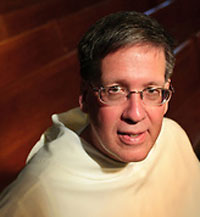 Episode 8Â St. Catherine of Siena: Her Life and Teachings with Fr. Thomas McDermott
Episode 8Â St. Catherine of Siena: Her Life and Teachings with Fr. Thomas McDermott
[powerpress]
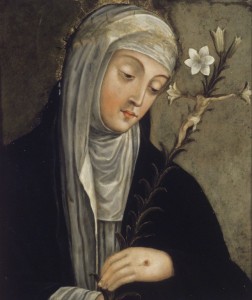 In this final episode, Fr. McDermott discuss the final step of the spiritual life which is actually comprised of two stages: “perfect love” and  “perfect union”. On the “Christ-Bridge” we find ourselves with St. Catherine at the “mouth” of Christ which corresponds to the first chapter of the “Song of Songs”.  Fr. McDermott expands on St. Catherine’s teachings on the role we have as sons and daughters of the Father.
In this final episode, Fr. McDermott discuss the final step of the spiritual life which is actually comprised of two stages: “perfect love” and  “perfect union”. On the “Christ-Bridge” we find ourselves with St. Catherine at the “mouth” of Christ which corresponds to the first chapter of the “Song of Songs”.  Fr. McDermott expands on St. Catherine’s teachings on the role we have as sons and daughters of the Father.
Fr. McDermott then offers a summation of St. Catherine’s teachings as a conclusion for our discussions.
Fr. Thomas McDermott, OP is Regent of Studies for the Dominican Province of St. Albert the Great and is the author of “Catherine of Siena: Spiritual Development in Her Life and Teaching” (Paulist, 2008) and “Filled with all the Fullness of God: An Introduction to Catholic Spirituality”. He obtained a doctorate in spiritual theology from the Angelicum and taught for several years at Kenrick-Glennon Seminary in St. Louis. He crrently serves as pastor at St. Vincent Ferrer, in Chicago, IL.
Tags: catholic, catholic podcast, catholic prayer, cathollc spirituality, McDermott, st catherine of siena, Thomas McDermott
This entry was posted on Tuesday, April 29th, 2014 at 5:24 am
You can follow any responses to this entry through the RSS 2.0 feed.
“My Nature is Fire”:
In your nature, eternal Godhead,
I shall come to know my nature.
And what is my nature, boundless love?
It is fire,
because you are nothing but a fire of love.
And you have given humankind
a share in this nature,
for by the fire of love you created us.
And so with all other people
and every created thing;
you made them out of love.
O ungrateful people!
What nature has your God given you?
His very own nature!
Are you not ashamed to cut yourself off from such a noble thing
through the guilt of deadly sin?
O eternal Trinity, my sweet love!
You, light, give us light.
You, wisdom, give us wisdom.
You, supreme strength, strengthen us.
Today, eternal God,
let our cloud be dissipated
so that we may perfectly know and follow your Truth in truth,
with a free and simple heart.
God, come to our assistance!
Lord, make haste to help us!Amen.
Heavenly Father, your glory is in your saints. We praise your glory in the life of the admirable St. Catherine of Siena, virgin and doctor of the Church. Her whole life was a noble sacrifice inspired by an ardent love of Jesus, your unblemished Lamb. In troubled times she strenuously upheld the rights of His beloved spouse, The Church. Father, honor her merits and hear her prayers for each of us. Help us to pass unscathed through the corruption of this world, and to remain unshakably faithful to the church in word, deed, and example. Help us always to see in the Vicar of Christ an anchor in the storms of life, and a beacon of light to the harbor of your Love, in this dark night of your times and men’s souls. Grant also to each of us our special petition . . . (pause to pray for your own intentions). We ask this through Jesus, your Son, in the bond of the Holy Spirit. Amen.
St. Catherine of Siena, Pray for us.
For the complete novena visit the St. Catherine of Siena Novena Page
Tags: catholic, catholic podcast, catholic prayer, cathollc spirituality
This entry was posted on Tuesday, April 29th, 2014 at 4:34 am
You can follow any responses to this entry through the RSS 2.0 feed.
Episode 16- Regnum Novum: Bringing forth the New Evangelization through Catholic Social Teaching with Omar Gutierrez -  St. John XXIII , Pacem in Terras (Peace on Earth) and the Natural Law
Gutierrez -  St. John XXIII , Pacem in Terras (Peace on Earth) and the Natural Law
[powerpress]
We live at a very special time. The confluence of many things has brought forth the clear need to be able to articulate the Social Teaching of the Catholic Church in a way that is accessible and applicable. This is not to be an effort where high-minded theories are to be bandied about. Rather, this is a time of opportunity wherein we can apply the Social Doctrine to the concrete so as to bring about a New Kingdom, a Revolution. – Omar G.
Pacem in Terris  (Peace on Earth) was a papal encyclical issued by Pope John XXIII on 11 April 1963.
 (Peace on Earth) was a papal encyclical issued by Pope John XXIII on 11 April 1963.
Also visit Omar’s “Discerning Hearts” page Catholic Social Teaching 101
You can find Omar Gutierrez’s book here
In The Urging of Christ’s Love Omar Gutiérrez tells the stories of eleven people who lived their lives in pursuit of Christ Jesus. Each Saint, Blessed or Servant of God is considered in the context of Catholic Social Teaching. Then at the end of each chapter a prayer is offered and quotes from the Compendium of the Social Doctrine of the Church are provided in order to link the lessons we can learn from the saint’s life to Church teaching. By discovering some new saint friends, and rediscovering some old ones, The Urging of Christ’s Love presents Catholic Social Teaching in an accessible and important way.
Tags: catholic, catholic podcast, catholic prayer, cathollc spirituality
This entry was posted on Monday, April 28th, 2014 at 7:34 am
You can follow any responses to this entry through the RSS 2.0 feed.
Episode 26- The Holy Rule of St. Benedict: A Spiritual Path for Today’s World with Fr. Mauritius Wilde O.S.B., 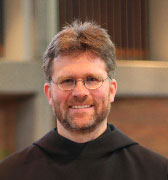 PhD.
PhD.
“In place of serving self…the community meal”
[powerpress]
From the Holy Rule of St. Benedict:
CHAPTERÂ XXIV
The degree of excommunication or punishment ought to be meted out according to the gravity of the offense, and to determine that is left to the judgment of the Abbot. If, however, anyone of the brethren is detected in smaller faults, let him be debarred from eating at the common table. The following shall be the practice respecting one who is excluded from the common table: that he does not intone a psalm or an antiphon nor read a lesson in the oratory until he hath made satisfaction; let him take his meal alone, after the refection of the brethren; thus: if, for instance, the brethren take their meal at the sixth hour that brother will take his at the ninth, and if the brethren take theirs at the ninth, he will take his in the evening, until by due satisfaction he obtaineth pardon.
 For more information about the ministry of the the Missionary Benedictines of Christ the King Priory in Schuyler, Nebraska visit here:
For more information about the ministry of the the Missionary Benedictines of Christ the King Priory in Schuyler, Nebraska visit here:
Tags: catholic, catholic podcast, catholic prayer, cathollc spirituality
This entry was posted on Monday, April 28th, 2014 at 6:38 am
You can follow any responses to this entry through the RSS 2.0 feed.

